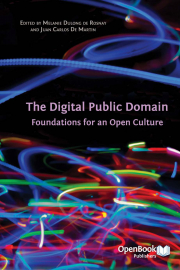The Digital Public Domain
| ,Foreword
Texte intégral
1The public domain is the sovereign space of all citizens of the world. Like the air we breathe, it is free for all people to use, without restriction, no rights reserved. Our public ownership of this domain of knowledge should be understood as a fundamental human right to access our shared knowledge, the use of which is not the result of a grant by any specific government.
2In this book, the members of Communia not only articulats this positive conception of our public domain, but also seek to make the European public domain actionable. The book defines the public domain of the European nations and studies the environment in which it operates. Most importantly, it recommends a set of actions to build and make use of that domain as an environment of shared intellectual property and multifaceted cultural heritage.
3This book could not come at a more important time. In a little over a decade, technological developments have shifted information production and distribution methods throughout the world. The way we interact with information has changed radically. Names like Wikipedia, Google, YouTube and, increasingly, Europeana speak for themselves. Our public domain is a wellspring of common wealth that provides ways to share that were inconceivable just a short time ago. The potential for growth that a free and accessible public domain presents to a networked Europe, rich in cultural heritage and with such a highly educated populace, is incredible. Yet the immediate implications can be hard to grasp, and policy interventions, quite often driven by special interests, painfully myopic.
4Communia bucks this trend. Each recommendation in this book addresses a genuine long-term concern. Their principle objective is to ensure a strong, free and accessible public domain. Any intervention concerning intellectual property laws will have an impact on innovation, education and economic growth for decades into the future. Communia’s proposals offer benefits for innovation, creation and societal enrichment that are not only immediate, they also grow with the passage of time. These proposals are designed to further propel the creative revolution that has been rising in the networked economy, providing the people of Europe with competitive advantage among developed nations.
5Seen from the perspective of users of the public domain, the greatest legal constraint on dissemination of public knowledge is from the threat of copyright litigation. This report recommends the action of developing a digital registry for intellectual works. This is, in my view, the single most important Communia recommendation, and I would like to expand upon it.
6A legal system of intellectual property in cyberspace without a digital registry makes no more sense than would a legal system of property without a registry of deeds. From a user’s viewpoint the cyber world offers access to three kinds of works: public domains works, which are legally free to use but it is up to the user to make the legal determination that the work is in the public domain; copyrighted works including information sufficient to allow the user to find the copyright holder and negotiate legal permission to use; and copyrighted works, orphaned by the absence of tracking information and therefore legally unusable. Determining the status of most works is a task beyond the vast majority of people, and can even be challenging to lawyers. For many individuals and institutions, even a 99 % certainty that a work is in the public domain is not comforting, if there is still a 1 % chance that use of the work could subject them to financially crippling litigation.
7This ambiguity regarding the copyright status of countless works, compounded by the threat of crushing litigation if one makes a misjudgment, blights our shared common domain and cries out for a better system. To the extent that we want to have an open and accessible public domain, which is to say, to the extent that we want our public domain to be usable, a reliable digital registry is a necessity.
8Communia proposes that each country — helped by Europeana and the great universities of Europe — sets up a registry by legally curating works in their nation’s public domain. Each registry should be backed by legal strength to defend its declarations. Each registry should be linked with other national registries and accessible to all countries. When aggregated, the registries will form a global consortium in support of our public domain in cyberspace, and hence a coherent force to hold litigation at bay.
9Cyberspace is structured by law and engineering. Communia seeks to build its national parks. The recommendations of this report are timely, wise and important. They should be carefully studied and then adopted.
Le texte seul est utilisable sous licence CC BY 4.0. Les autres éléments (illustrations, fichiers annexes importés) sont « Tous droits réservés », sauf mention contraire.




